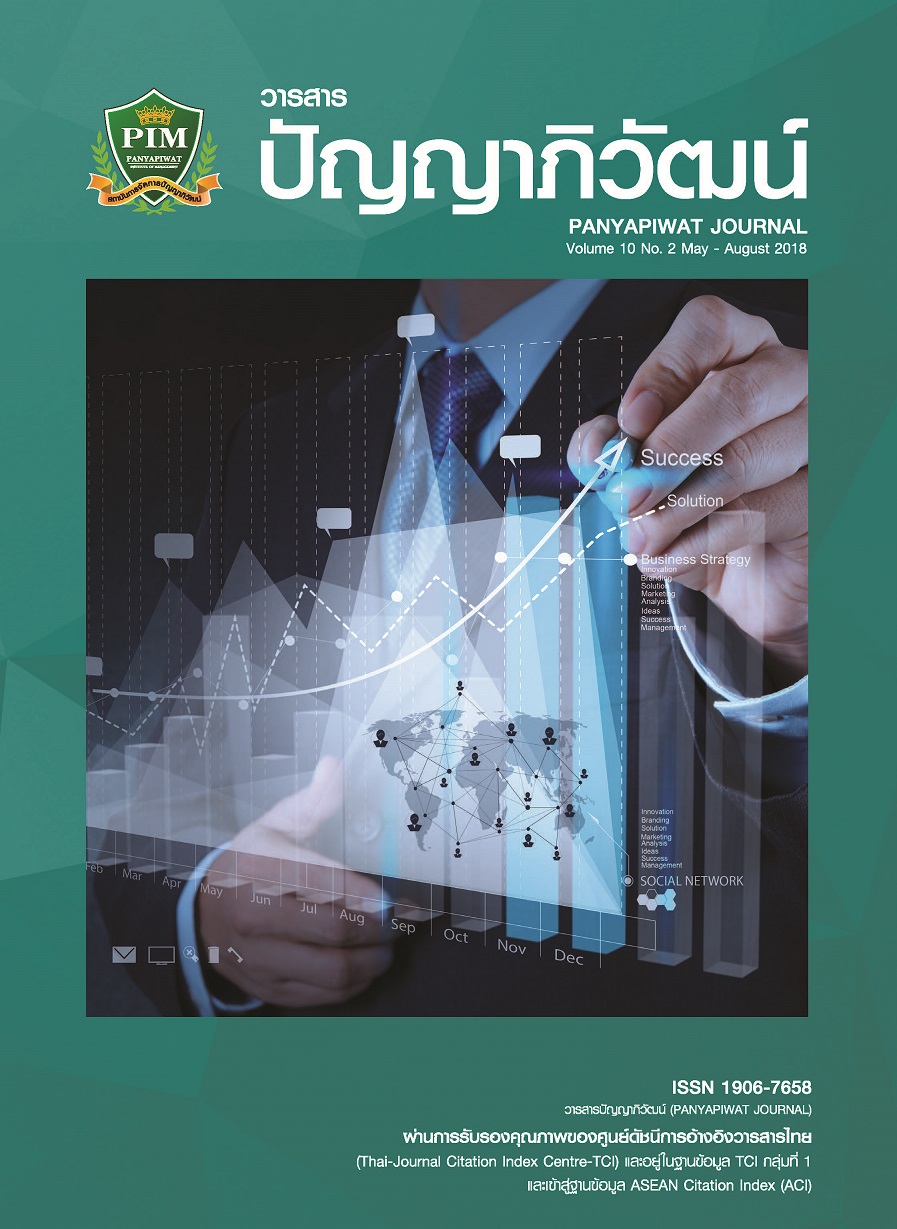การพัฒนารูปแบบการจัดการทุนทางสังคมเพื่อการพัฒนาชุมชนอย่างยั่งยืน
Main Article Content
บทคัดย่อ
การวิจัยครั้งนี้มีวัตถุประสงค์เพื่อศึกษาคุณลักษณะของงานวิจัยด้านการจัดการทุนทางสังคม ปัจจัยเงื่อนไขในการจัดการทุนทางสังคม และเพื่อพัฒนารูปแบบการจัดการทุนทางสังคมเพื่อการพัฒนาชุมชนอย่างยั่งยืน โดยมีจำนวนงานวิจัยที่เป็นวิทยานิพนธ์ ปริญญานิพนธ์ และรายงานการวิจัย ที่นำมาสังเคราะห์ด้วยวิธีวิทยาการวิจัยแบบ “การวิจัยชาติพันธุ์วรรณนาอภิมาน” จำนวน 20 เรื่อง พบว่า คุณลักษณะงานวิจัยที่ศึกษา ส่วนใหญ่เป็นวิทยานิพนธ์เกี่ยวกับทุนทางสังคมในด้านทุนมนุษย์ ทุนสังคม ทุนธรรมชาติ ผู้ให้ข้อมูลส่วนใหญ่เป็นผู้นำชุมชน พื้นที่ที่ศึกษาส่วนใหญ่อยู่ในภาคกลาง ใช้วิธีการตรวจสอบสามเส้า และมีวัตถุประสงค์เพื่อศึกษาองค์ประกอบทุนทางสังคมที่มีอยู่ในชุมชน โดยผู้นำสามารถจัดการทุนทางสังคม มีเครือข่ายที่เข้มแข็งเกิดจากการประสานของหลายภาคส่วน ซึ่งเป็นปัจจัยสนับสนุนให้เกิดการมีส่วนร่วมในชุมชน ความสัมพันธ์ของคนในชุมชนเกิดจากปัจจัยทั้งภายใน ได้แก่ ทรัพยากรธรรมชาติ หน่วยงานในชุมชน ผู้นำ ความสัมพันธ์ทางเครือญาติ ประเพณีวัฒนธรรมของชุมชน และปัจจัยภายนอก ได้แก่
หน่วยงานที่เข้ามาเกี่ยวข้องกับชุมชนที่มีผลต่อการเปลี่ยนแปลงทุนทางสังคม ทรัพยากรธรรมชาติในชุมชนส่งผลต่อวิถีการดำรงชีวิตของคนในชุมชน ด้วยการพึ่งตนเอง ภูมิปัญญา และวัฒนธรรมเปลี่ยนแปลงไปตามบริบทของสังคม ปัจจัยเงื่อนไขในการจัดการทุนทางสังคมคือ มิติด้านกลุ่มและเครือข่าย มิติด้านความสัมพันธ์ของคนในชุมชน มิติกิจกรรมและความร่วมมือ มิติด้านข่าวสารและการสื่อสาร มิติความสมานฉันท์ทางสังคม และมิติด้านการมีอำนาจและกิจกรรมทางการเมือง และรูปแบบการจัดการทุนทางสังคมเพื่อการพัฒนาชุมชนอย่างยั่งยืนคือ ความสัมพันธ์ขององค์ประกอบในการจัดการทุนทางสังคมคือ ทุนมนุษย์ ทุนสังคม ทุนกายภาพ ทุนธรรมชาติ ทุนการเงิน ทุนภูมิปัญญาและวัฒนธรรมเชื่อมโยงไปสู่มิติทุนทางสังคม ทั้ง 6 มิติ โดยมีกระบวนการจัดการทุนทางสังคมอย่างเป็นระบบเป็นตัวกลางในการขับเคลื่อนให้เกิดการพัฒนาชุมชนอย่างยั่งยืนใน 6 ด้านคือ ความเข้มแข็งของชุมชน ชุมชนพึ่งพาตนเองได้ การสร้างองค์ความรู้ใหม่ การถ่ายทอดจากรุ่นสู่รุ่น เครือข่ายความร่วมมือ และผู้นำที่มีศักยภาพ โดยเลือกชุมชนบ้านหนองขาว อำเภอท่าม่วง จังหวัดกาญจนบุรี เป็นพื้นที่ศึกษา โดยใช้การศึกษาวิจัยเชิงคุณภาพด้วยวิธีการสังเกต การสัมภาษณ์เชิงลึก ผู้ให้ข้อมูลได้แก่ กลุ่มผู้นำชุมชน กลุ่มอาชีพ และกลุ่มประชาชน จำนวน 15 คน วิเคราะห์ข้อมูลโดยสร้างข้อสรุปแบบอุปนัย
และนำเสนอข้อมูลในรูปแบบของการพรรณนาความ พบว่า การจัดการทุนทางสังคม ชุมชนบ้านหนองขาว มีความสอดคล้องกับองค์ประกอบในการจัดการทุนทางสังคมทั้ง 6 มิติ และสอดคล้องกับทั้ง 6 มิติ การขับเคลื่อนทุนทางสังคม
Article Details
“ข้าพเจ้าและผู้เขียนร่วม (ถ้ามี) ขอรับรองว่า บทความที่เสนอมานี้ยังไม่เคยได้รับการตีพิมพ์และไม่ได้อยู่ระหว่างกระบวนการพิจารณาลงตีพิมพ์ในวารสารหรือแหล่งเผยแพร่อื่นใด ข้าพเจ้าและผู้เขียนร่วมยอมรับหลักเกณฑ์การพิจารณาต้นฉบับ ทั้งยินยอมให้กองบรรณาธิการมีสิทธิ์พิจารณาและตรวจแก้ต้นฉบับได้ตามที่เห็นสมควร พร้อมนี้ขอมอบลิขสิทธิ์บทความที่ได้รับการตีพิมพ์ให้แก่สถาบันการจัดการปัญญาภิวัฒน์หากมีการฟ้องร้องเรื่องการละเมิดลิขสิทธิ์เกี่ยวกับภาพ กราฟ ข้อความส่วนใดส่วนหนึ่งและ/หรือข้อคิดเห็นที่ปรากฏในบทความข้าพเจ้าและผู้เขียนร่วมยินยอมรับผิดชอบแต่เพียงฝ่ายเดียว”
เอกสารอ้างอิง
Areekul, C. (2013). Model Development for Strengthening Social Capital for Being a Sustainable Lifelong Learning Society. Doctoral dissertation, Department of Non-Formal Education, Faculty of Education, Chulalongkorn University. [in Thai]
Kaewmeesee, B. (2002). The Roles of Executive Leadership. Master’s thesis, Chulalongkorn University, Graduate School. [in Thai]
Keeves, J. P. (1988). Educational Research, and Methodology, and Measurement. Oxford: Pergamon Press.
Meksithongkham, B. (2004). A Meta-Ethnography Research on Community Participation in Educational Management. Master’s thesis, Faculty ofEducation, Chulalongkorn University. [in Thai]
Ministry of Social Development and Human Resources. (2005). The Study of Standardizationand Human Security Indicators. Bangkok: Office of Social Development and Human Security. [in Thai]
Noblit, G. W. & Hare, R. D. (1988). Meta-Ethnography: Synthesizing Qualitative Approaches. Boston: Sage Publication.
Office of the National Economic and Social Development Board. (2005). Social Capital for Citizen. Bangkok: 21 Century. [in Thai]
Puang-ngam, K. (2008). Community and Local Self Governance. Bangkok: Thammasat University. [in Thai]
Settapanich, S. (2001). A Proposed Model of Total Quality Management for Private General Education Schools. Master’s thesis, Educational Administration, Faculty of Education, Phranakhon Si Ayutthaya Rajabhat University. [in Thai]
Suktam, W. (2013). Buddhist Approach to Human Capital Development in the Age of Globalization. Doctoral dissertation, Public Administration Program, Valaya Alongkorn Rajabhat University under the Royal Patronage. [in Thai]
Urquhart, C. (2013). Grounded Theory for Qualitative Research: Practical Guide. London: Sage Publications.
Wasee, P. (1999). National Strategy for Economic Strength, Society and Morals (2nd ed.). Bangkok: Moh-chao-Ban Publishing. [in Thai]
Wasee, P. (1999). Sufficiency Economy and Civil Society. Bangkok: Pimdee Publications. [in Thai]
Wirutchai, N. (1999). Meta-Analysis. Bangkok: Faculty of Education, Chulalongkorn University. [in Thai]
Yenbamroong, N. (2015). Social Capital with Yala Provincial Development. Bangkok: Center of Megacity and City Studies, Rangsit University. [in Thai]


